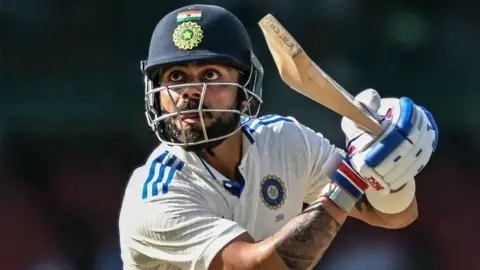 cricket match between India and Bangladesh at the Green Park Stadium in Kanpur on September 30, 2024″ class=”sc-a34861b-0 efFcac”/>AFP
cricket match between India and Bangladesh at the Green Park Stadium in Kanpur on September 30, 2024″ class=”sc-a34861b-0 efFcac”/>AFPThe Border-Gavaskar cricket/articles/c0k8z8llxyjo” class=”sc-c9299ecf-0 bZUiKB”>Test series between Australia and India, The tournament, which begins on Friday in Perth, pits the two best teams in red-ball cricket against each other.
The last four series between these two countries have been compelling, making it the pre-eminent rivalry in Test cricket today. This period was particularly good for India, who won the championship on all four occasions, including twice in a row in Australia.
But India comes unexpectedly recent whitewashing by New Zealand, marked by the failure of top stars, has raised doubts about the future for some big names.
The focus of the current series is on veterans Rohit Sharma, Virat Kohli, R Ashwin and Ravindra Jadeja, who have been the pillars of India's dominance across formats over the last decade. However, with advancing age and recent declines in performance, questions arise about their ability and willingness to continue competing at the highest level.
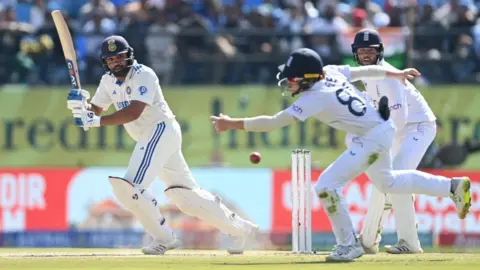 Getty Images
Getty ImagesThe biggest problem was the form of batsman Virat Kohli, the poster boy of Indian cricket.
His most recent struggles have spanned more than three years. In the last five years, Kohli, who once racked up Test centuries with ease, has managed to add just two more to the 27 he had earlier amassed at a rapid pace.
His Test batting average, once in the mid-50s, has fallen below 48. The running machine that was touted as the most likely to improve Sachin Tendulkar's Test records is sputtering.
Australia has long been a happy hunting ground for Kohli. He made his maiden Test century in Adelaide in 2011 and during the 2014-15 series he excelled with almost magical strokeplay, cementing his place among the game's all-time greats.
Kohli's fiery aggression – surpassing even the Australians at their own game – earned him respect and adoration from fans Down Under. When he led India to them historic first Test series win In Australia it achieved cult status over 70 years.
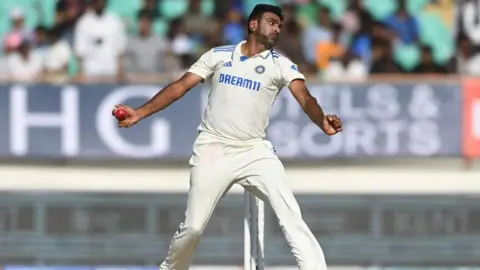 Getty Images
Getty ImagesCaptain Rohit Sharma, a late bloomer in Test cricket, may have had comparatively modest success in the format, but the respect he gives to his opponents is as significant as the respect shown to Kohli.
After starting with centuries in his first two Tests, Sharma briefly lost his position and place until he was given the opening spot. He hasn't looked back since.
Sharma's skills in white-ball cricket have often overshadowed his outstanding batting performances in Tests, where he can be destructive and sublime as the situation demands.
He is often criticized for his inconsistency in producing major hits. However, there is a consensus that India's chances of winning Tests will increase dramatically if Sharma finds his rhythm.
Although Sharma didn't have a long, lean trot like Kohli, he has unfortunately suffered a dramatic slump of late Home tests against Bangladesh and New Zealand.
In 10 innings each of these games, neither Sharma nor Kohli managed to muster even 200 runs. The caliber and class of Sharma and Kohli are undeniable. The concern is whether they are over the hill.
Ashwin and Jadeja are undoubtedly world-class all-rounders. With more than 3,000 runs apiece, Ashwin has crossed the 500 Test wickets mark while Jadeja recently crossed the 300 mark. Both would be welcomed with open arms to any team in the world.
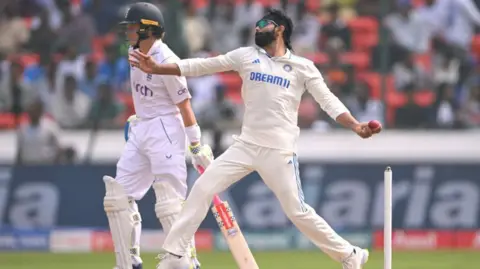 Getty Images
Getty ImagesAt the same time, they have often destroyed opposing teams, even if their international record is modest.
In 10 Tests in Australia, Ashwin has taken 39 wickets at an average of 42.15. Meanwhile, Jadeja has taken 14 wickets in just four Tests at an impressive average of 21.78 – better than Ashwin's, albeit from a smaller sample size.
But such statistics can also be misleading.
Ashwin is the more experimental of the two, adding an element of surprise and excitement to his bowling. In 2021, he had Australia's best batsmen, Steve Smith and Marnus Labuschagne, dancing to his tune. Jadeja, on the other hand, is the master of control – economical and deadly, especially on a crumbling pitch.
The value of Ashwin and Jadeja goes beyond just bowling. Ashwin's bold knock in the memorable 2021 series was crucial to India's victory in the series. Jadeja has often bolstered the batting power with strong defense and bold hitting when the top order has waned. And he is worth 30-35 runs from fielding alone.
The concerns about Ashwin and Jadeja stem from their relatively modest bowling results against New Zealand at home last month. Ashwin took nine wickets at a strike rate of 66.33 while Jadeja claimed 16 wickets at a strike rate of 37.93.
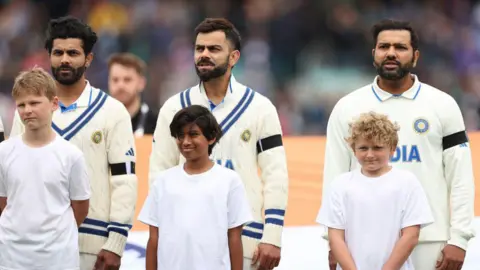 Getty Images
Getty ImagesIn fact, the New Zealanders outperformed these two top players and India lost a home series after 18 Test wins. As in the case of Sharma and Kohli, was this a deviation or a sign of fading strength?
It would be reckless to dismiss players of such high caliber and experience based on a handful of statistics. Beyond their skill and ambition, great players rely on confidence and pride to overcome the toughest challenges and deliver when it matters most.
However, as the winter of their careers approaches, the performance of these outstanding players in the current series is crucial – both for the team and for themselves.
Success here will be a sign of resurgence and help them fend off stiff competition from a wave of exceptionally talented young players. On the other hand, failure will only increase calls for a broader transition in Indian cricket.








